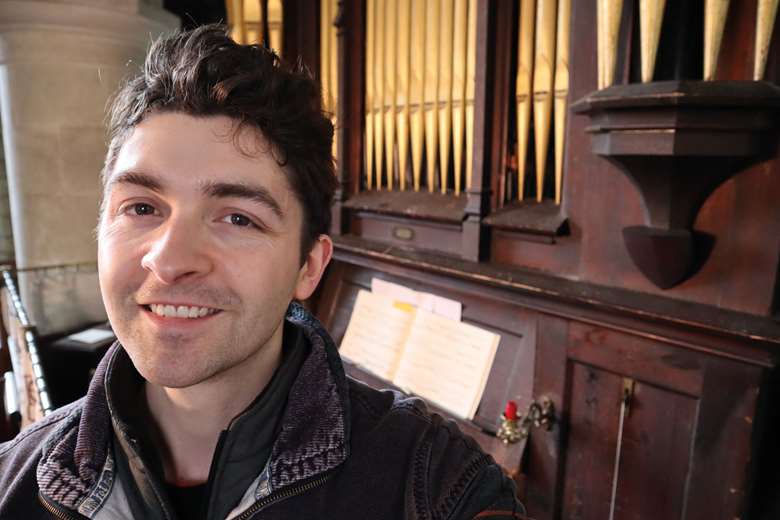Ben Maton – The Salisbury Organist: ‘Never lose sight of the organist!’
Ben Maton
Friday, May 10, 2024
The Salisbury Organist explores and films at two more country churches, while celebrating the work of George Herbert and questioning a tendency to forget the organist. Photos by Ben Maton

Occasionally I receive website enquiries like this: ‘Ben - what was that splendid piece you played at the end of evensong tonight?’ It is a wonderful compliment, but as my church did not hold evensong, they have contacted the wrong organist.
Anyone can identify with the disappointment of performing with passion and dedication only to remain anonymous, or worse, to be mistaken for another. Many organists like to be hidden, and organ consoles are hidden for practical and liturgical reasons, but the skill and identity of the musician is often overlooked when they are invisible. There is no doubt that the world needs more organists, but the excitement of learning a musical instrument is usually driven by the spectacle of seeing it played. We gaze in awe as a violinistplays, apianistplays, a guitarist plays, but when we visit a cathedral or attend a wedding, we often recount that the ‘organ’ played…seemingly, by itself.
I hope that my YouTube channel does something to correct this. By filming myself playing village church organs, cameras trained on hands and feet, with music theory in simple terms, my videos have attracted 25,000 subscribers and two million views in seven months. My aim is to help inform and inspire, to arouse interest in the pipe organ and the eccentricities required to play it.
Village churches are the perfect setting. The organs are small and basic, with just one or two keyboards and pedals, and the pastoral scenery is beautiful in itself. During a recent filming visit to St Mary’s, Odstock, near Salisbury, I performed Bach’s mighty Toccata and Fugue in D Minor on an instrument with just ten stops, preceded by an explanation of ‘Fugue’. Instead of discussing subjects, countersubjects, counterpoint and expositions, I compare fugue to a spider spinning a web. It begins with one tiny strand, and from that strand weaves a structure both mathematically perfect and artistically beautiful. As my hands and feet dance over keys and pedals, viewers gain an insight into the physical and mental demands on the organist, the creativity and imagination required to bring these musical instruments to life.
Furthermore, the challenge of the organist involves coping with the quirks of the instrument. Tuning problems and mechanical clatters characterise village church organs. On a sunny morning in April, viewers accompany me to the charmingly named parish of Fugglestone. The village has disappeared, merged with other parishes, and only the pretty 13th-century church remains. It was here, from 1630 until his death in 1633, that George Herbert presided as Rector. Here he penned The Country Parson and many of his poems. I came to record the church organ, one of the last in England still hand-pumped, the church having no electricity, water or heating, lit only by Victorian gas lamps, and now closed and seeking lottery funding. My brother Billy provided muscle for the bellows, while I, seated at the dusty, unloved and feeble instrument, filled the church with strains of Gwalchmai, a hymn tune inseparable from one of Herbert’s best-loved poems:
King of glory, King of peace,
I will love thee;
and, that love may never cease,
I will move thee.
Thou has granted my request,
thou has heard me;
thou didst note my working breast,
thou hast spared me.
The tone is raspy and thin, and the hand-pumping makes it uneven. But to me the sound rivals any of the grandest instruments, because of its curious poignancy. We aim at perfection, but sometimes imperfection is where music affects us most. Since recording the episode I’ve been touched by comments from viewers worldwide who love Herbert’s poems, reminisce on pumping village organs as children, or who have simply never seen an organist play.
So, next time you hear an organ, listen to the power of the pipes, the rumble of the bass notes, the craftsmanship of instrument and music. But most of all, think of the player unseen in the loft, or behind the curtain: their perseverance, years of study, practice, coordination, commitment and reverence for the music. Though he or she is hidden, we should never lose sight of the organist.
Ben Maton is an organist and creator of the YouTube channel, The Salisbury Organist
This article originally appeared in the Summer 2024 issue of Choir & Organ. Never miss an issue – subscribe today






